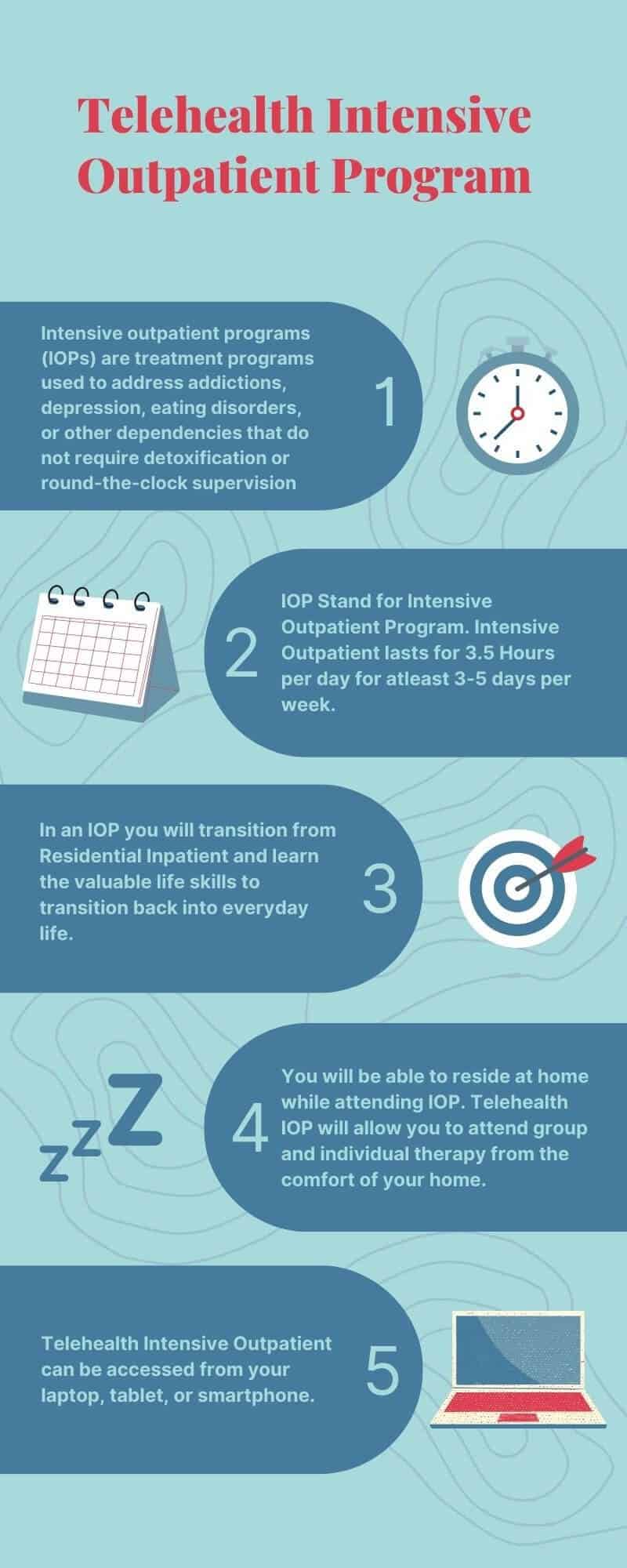Browsing the Intricacies of Twin Diagnosis Therapy Within an Intensive Outpatient Program Setting
In the world of psychological health and addiction treatment, the junction of twin diagnosis offers a nuanced challenge that demands an extensive and customized strategy. Within the boundaries of an Extensive Outpatient Program (IOP) setting, the complexities of attending to co-occurring psychological wellness problems and material use disorders need a delicate balance of expertise and resources to navigate. The integration of evidence-based techniques, collective initiatives amongst multidisciplinary teams, and an eager understanding of the special requirements of each person are necessary parts in properly taking care of twin medical diagnosis within an IOP structure. By checking out the ins and outs of double diagnosis treatment within this intensive outpatient context, a more clear course arises towards holistic and sustainable recovery for those facing these linked difficulties.
Dual Medical Diagnosis Overview

Recognizing dual diagnosis is crucial as it requires a detailed and integrated method to therapy. By recognizing the interplay in between material use and psychological health, health care service providers can customize treatments to meet the distinct demands of each individual. This holistic strategy not only addresses signs however additionally targets hidden elements that add to the twin medical diagnosis.
Furthermore, neglected double medical diagnosis can bring about a cycle of regression and intensifying mental wellness signs and symptoms. By recognizing the complexity of twin medical diagnosis and giving customized treatment, medical care professionals can sustain people in attaining lasting recovery and improved psychological health.
Tailored Therapy Strategies
Recognizing the intricate interplay in between material usage conditions and psychological health and wellness conditions, the advancement of tailored treatment strategies is extremely important in resolving the intricacies of twin medical diagnosis in psychological health and wellness treatment. Tailored treatment strategies are individualized approaches that think about the special requirements, challenges, and objectives of people dealing with double diagnosis. These plans are designed collaboratively by a multidisciplinary group of specialists, consisting of psychiatrists, psychologists, social workers, and dependency professionals, to make sure detailed and integrated care.
Tailored therapy strategies usually involve a mix of treatments, medicines, and behavioral treatments that target both the substance use problem and the mental health problem all at once. These strategies may consist of cognitive-behavioral therapy, dialectical behavior treatment, medication-assisted treatment, individual therapy, group treatment, and family members therapy, to name a few evidence-based interventions. By tailoring treatment strategies to private circumstances, tailored strategies can deal with the origin triggers of twin diagnosis, advertise long-term healing, and improve general quality of life for individuals having problem with co-occurring disorders.
Integrated Treatment Approach
An integrated treatment method in twin diagnosis treatment incorporates medical, mental, and social treatments to deal with the intricate needs of individuals with co-occurring material use conditions and psychological health problems. This approach recognizes that treating one facet of a dual diagnosis without attending to the various other can lead to inefficient end results. By incorporating medical treatments such as drug management for mental wellness conditions with mental therapies like cognitive-behavioral therapy for compound usage disorders, individuals check these guys out get thorough care that targets all aspects of their twin medical diagnosis.
Additionally, the social facet of incorporated treatment includes attending to ecological factors that may add to the development or perpetuation important use and mental health and wellness problems. This can include family dynamics, housing instability, or lack of social support. By incorporating social interventions like family therapy, professional assistance, and neighborhood sources, the treatment ends up being much more holistic and tailored to the individual's details demands. Overall, an incorporated treatment technique in double medical diagnosis therapy within an extensive outpatient program setup aims to offer extensive, effective, and personalized like individuals dealing with co-occurring conditions.
Obstacles in IOP Setting
In the context of twin diagnosis therapy within an intensive outpatient program, browsing the complexities of co-occurring material use problems and mental wellness conditions offers significant difficulties. Among the main hurdles in the IOP setting is the control of care in between mental health and wellness professionals and chemical abuse specialists to make certain a detailed therapy method. This calls for effective communication, cooperation, and a deep understanding of how these problems connect and influence each various other.

Additionally, addressing preconception and resistance to treatment within the IOP setup can hinder progression. Some individuals might be reluctant to divulge their double medical diagnosis or may really feel ashamed, impeding their involvement in the healing process. Getting rid of these obstacles necessitates a helpful and non-judgmental setting that promotes depend on and openness.

Collaborative Specialist Initiatives
Effective double diagnosis therapy in an intensive outpatient program demands seamless cooperation among psychological health and wellness specialists and compound misuse experts to ensure a detailed and integrated technique to care. By working with each other, these professionals can produce customized treatment strategies that cater to the special needs of each individual, considering both their mental wellness and material abuse click for more info difficulties.
Joint efforts likewise encompass regular interaction and information sharing among group participants to guarantee a natural therapy method. This might entail case seminars, joint sessions with the individual, or shared documentation to track progress and change therapy strategies as needed. Furthermore, cooperation might include involving other healthcare experts such as health care physicians or family therapists to supply all natural assistance to the patient. Ultimately, an unified front of experts collaborating enhances the effectiveness of dual diagnosis treatment within an intensive outpatient program.
Conclusion
In final thought, efficient double diagnosis treatment within an intensive outpatient program setting requires tailored therapy strategies and an integrated care approach. Challenges may occur in this setup, yet joint initiatives amongst specialists can assist navigate these complexities. By addressing the unique demands of people with co-occurring mental health and material utilize disorders, IOP programs can provide thorough and all natural like support recuperation and general well-being.
Comments on “Intensive Outpatient Program (IOP): An Adaptable Option for Dependency Therapy.”